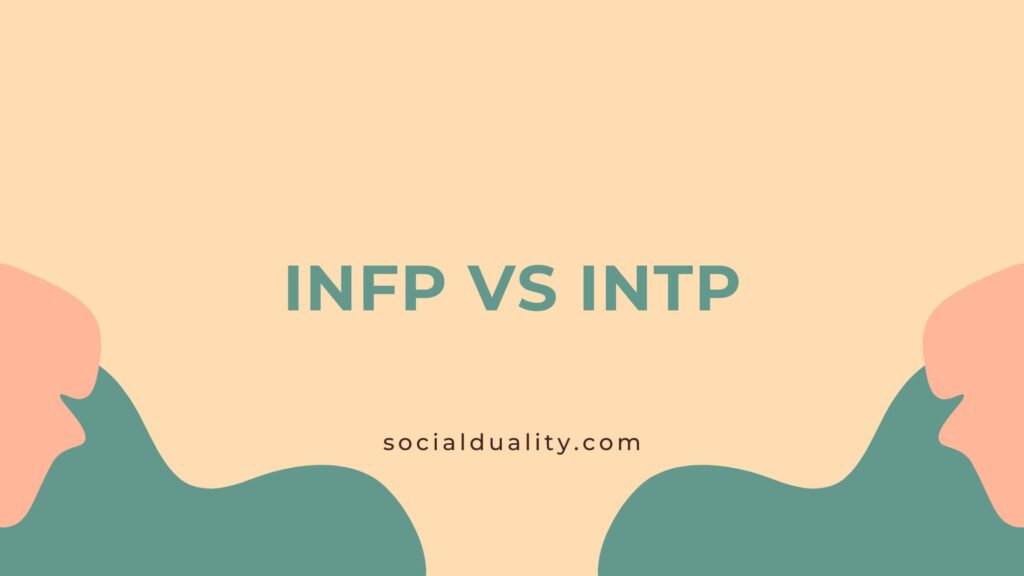Cognitive Functions: Ti vs. Fi
In the realm of cognitive functions, Introverted Thinking (Ti) and Introverted Feeling (Fi) reveal the nuances between INTP and INFP personality traits. INTPs, with their Ti-dominant function stack, thrive on logic, dissecting issues with precision. They often find solace in analyzing systems or theories, making their decision-making process highly rational. Their inferior function might be less visible, but it’s there, lurking in the background.
Meanwhile, INFPs, guided by Fi as their dominant function, dive deep into emotional waters. They prioritize personal values and find meaning through empathy. This introverted judging function allows them to navigate relationships with emotional intelligence and compassion. While both types share some cognitive function similarities, their dominant and inferior combinations set them apart.
The INFP understanding of emotions versus the analytical prowess of INTPs creates distinct dynamics in relationships and comments on personal values. INTPs may appear reserved, while INFPs wear their hearts on their sleeves. This dance between introverted thinking and introverted feeling shapes how they approach the world, from workplace challenges to social interactions. Users of MBTI often marvel at these contrasts.
Analytical vs. Empathetic Thinking
Balancing the scales of thinking, INTPs and INFPs offer unique perspectives. INTP function stack is heavy on logic, emphasizing objective analysis. Their inferior function sometimes casts a shadow, influencing decisions subtly. INFP similarities lie in their embrace of feelings, making them champions of empathy and compassion.
In relationships, these differences become evident. One might say INTPs are like chess players, strategizing each move with precision. INFPs, on the other hand, are more like poets, weaving emotions into their interactions. This creates a fascinating dance between logic and emotion.
Career preferences show these contrasts vividly. INTPs enjoy roles demanding abstract thinking, while INFPs thrive where emotional insights shine. Stress management also varies. INTPs may detach, while INFPs lean into their feelings for balance.
Considering comments on their personal values highlights the judging function in play. INTPs prioritize logical consistency, whereas INFPs cherish authenticity. Both bring unique strengths to the table, enriching any team or project.
- INTPs gravitate towards theoretical fields.
- INFPs excel in emotionally driven tasks.
- Logical analysis is key for INTPs.
- INFPs prioritize emotional harmony.
- INTPs strategize like chess players.
- INFPs create like poets.
- Stress approaches vary significantly.
- Both enrich teamwork with their unique insights.


Relationship Dynamics and Communication
In the realm of relationship dynamics, the INTP and INFP often sail different seas. INTPs, with a penchant for logic, may seem aloof. They often prefer to rely on societal norms until trust is built. On the flip side, INFPs show a natural talent for resolving conflicts and maintaining peace. Their emotional compass often guides them through turbulent waters.
When it comes to communication, INTPs can sometimes miss the emotional cues. They might get lost in their thoughts, analyzing and re-analyzing. Meanwhile, INFPs, with their heightened emotional intelligence, navigate feelings like seasoned sailors. They feel deeply, understanding not just their own emotions, but those of others too.
In terms of decision-making, the two differ like night and day. INTPs stick to logic, while INFPs lead with their hearts. This difference is a double-edged sword. It can lead to misunderstandings but also enrich the relationship with diverse perspectives.
Finally, INTPs and INFPs bring different strengths to the table. They complement each other, making teamwork not just effective, but also a learning journey.
Decision-Makers vs. Conflict Resolvers
Decision-makers and those who resolve conflicts often see the world differently. This is evident in the unique approaches of INTPs and INFPs. INTPs, with their analytical minds, prefer logic-driven decisions. They lean on their dominant and inferior cognitive functions, sometimes appearing distant. This can be their Achilles’ heel, especially in emotionally charged situations.
In contrast, INFPs shine as conflict resolvers. They excel at navigating emotional waters, prioritizing harmony. Their strength lies in their emotional insight, often using it to maintain peace. While INTPs might leave comments that sound detached, INFPs engage with empathy.
In relationship dynamics, these differences can be both a challenge and a boon. INTPs bring a function stack that favors logic, while INFPs offer emotional depth. This balance can foster mutual growth, as each learns from the other’s strengths.
Understanding these differences helps in creating a harmonious environment. Whether at home or in the workplace, recognizing the inferior function is key. This can lead to improved communication and problem-solving approaches.
| Aspect | INTP | INFP |
|---|---|---|
| Decision-Maker | Yes | No |
| Conflict Resolver | No | Yes |
| Emotional Intelligence | Limited | High |
| Analytical Thinking | Strong | Moderate |
| Relationship Dynamics | Logic-based | Emotion-based |
Emotional Intelligence and Empathy
Emotional smarts and the power of understanding set INFPs apart. They see emotions like a map, guiding others with their hearts. They offer comfort in chaos, often acting as peacekeepers. On the flip side, INTPs might seem like they’re on Planet Logic. Emotions? Not always their forte. They sometimes stand on the sidelines, watching the emotional game unfold.
Both types have their strengths, but their paths diverge. INFPs lead with compassion, while INTPs decode the world with logic. Each type brings unique colors to the canvas of human interaction. INFPs can teach INTPs about empathy and warmth, while INTPs can show INFPs the beauty of reasoned thought.
In the workplace, this dynamic plays out in fascinating ways. INFPs excel when empathy is key, while INTPs thrive in analytical tasks. Yet, both face challenges when stress knocks on their door. They might retreat, each finding solace in their dominant and inferior functions. It’s a delicate dance of head and heart, with plenty of room for growth.


Career Preferences and Problem-Solving
Career choices and solving problems show the unique flavors of INTPs and INFPs. INTPs gravitate towards careers that let them play with ideas, like theoretical physics. They excel when they can dissect concepts and reconstruct them. This comes from their preference for logic and reason, making them shine in positions needing abstract thought. On the other hand, INFPs bring their emotional insight to the table. They do well in roles like data analysis, where their knack for understanding emotions adds a practical twist.
When tackling problems, INTPs lean on logic and often take their time. INFPs, however, use their emotional compass, aiming for harmony. Both types face stress differently. INTPs might withdraw, while INFPs look for emotional balance. Their approaches to stress and problem-solving can influence their workplace performance.
- INTPs love theoretical career paths.
- INFPs excel in emotional insight roles.
- INTPs solve problems with logic.
- INFPs aim for harmony in solutions.
- INTPs and INFPs manage stress diversely.
- Workplace performance varies by stress response.
- INTPs thrive in abstract thinking environments.
- INFPs shine where emotions matter.
Workplace Strengths and Weaknesses
Exploring workplace attributes, INTPs and INFPs show distinct approaches to tasks. INTPs prioritize intellectual pursuits, thriving on analysis and theory. They excel in environments where they can apply their analytical thinking. Yet, they may wrestle with routine tasks or emotional situations. Their inferior function often limits their empathy and team dynamics.
Meanwhile, INFPs shine with creativity and a knack for empathy. They bring harmony and emotional insight into their roles, often connecting well with others. Sometimes, though, they may find decision-making challenging due to their emotional depth. Stress can affect their performance, leading to withdrawal or overthinking.
Both have unique function stacks. INTPs often focus on logic; INFPs on emotions. Each type has its dominant and inferior attributes, shaping their workplace effectiveness and stress responses. Users might provide comments that differ based on these traits.
Famous personalities from each type demonstrate these strengths in varied professions, contributing to their teams with distinct personal values and problem-solving styles.
| Aspect | INTPs | INFPs |
|---|---|---|
| Strengths | Analytical, Theoretical | Creative, Empathetic |
| Weaknesses | Routine tasks, Emotional cues | Decision-making, Overthinking |
| Function Stack Focus | Logic | Emotion |
| Stress Management | Withdrawal | Overthinking |
| Famous Personalities | Albert Einstein | William Shakespeare |
Creativity, Innovation, and Stress Management
Creativity and innovation can bloom differently for INTP and INFP types. INTPs often dive into logical systems, crafting theoretical innovations. They might feel like a fish out of water in emotional settings. Meanwhile, INFPs channel their emotional intelligence to find creative solutions, balancing stress with a quest for harmony. Stress management for both involves unique challenges. INTPs, facing routine tasks, might retreat into their minds, while INFPs could overthink situations. Their inferior function can sometimes throw a wrench into their well-oiled machines.
In a workplace setting, both types bring valuable contributions. But their approaches and reactions to stress differ. INTPs may prefer environments that allow them to comment on logical inconsistencies. In contrast, INFPs aim for an emotionally balanced atmosphere. This divergence highlights the differences in their dominant and inferior cognitive functions. Personal growth and learning often involve understanding these aspects. Things MBTI enthusiasts might note how both types thrive when they embrace their strengths and address their weaknesses.
Ultimately, stress management for both types is a journey of understanding and leveraging their cognitive functions.


Conclusion
INTPs and INFPs both bring unique strengths to the table. INTPs love diving into puzzles and finding logical solutions, like detectives in a mystery novel. They value facts and theories, enjoying the thrill of cracking a tough code. Meanwhile, INFPs are more like empathetic listeners, always ready to lend an ear and understand others’ feelings. They use their values as a compass, guiding them through life’s many challenges.
In relationships, these types shine in their own ways. INTPs might seem distant at first, but they’re just trying to figure things out. INFPs, though, are like warm blankets, eager to resolve conflicts and keep things cozy. Both types can learn a lot from each other’s strengths, blending logic with empathy for richer, more meaningful interactions. In the end, both are like different colors in a rainbow, each adding beauty to the spectrum of human personality.
What are the main differences between Ti and Fi cognitive functions?
INTPs use Introverted Thinking (Ti) to analyze and reason logically. They love theories and consistent ideas. INFPs, however, rely on Introverted Feeling (Fi). They focus on feelings and personal values. This means they often understand emotions better and make decisions based on what feels right.
How do INTPs and INFPs think differently?
INTPs are like detectives. They solve puzzles using logic and facts. They can seem a bit lost in thought sometimes. INFPs are like artists. They see the world through feelings and emotions. This helps them connect deeply with others and situations.
How do INTPs and INFPs handle relationships?
In relationships, INTPs tend to rely on logic. They stick to societal norms until they trust someone. Trust is key for them. INFPs focus on keeping everyone happy. They adapt to emotional situations to maintain peace and harmony.
What are the career strengths of INTPs and INFPs?
INTPs thrive in jobs that need deep thinking, like philosophy or theoretical physics. They love exploring ideas. INFPs do well in structured environments, like data analysis. They use their emotional insights to solve problems.
How do INTPs and INFPs manage stress?
Both types have creative ways to handle stress. INTPs focus on logical solutions. They might seem detached when stressed. INFPs use their emotional understanding to find balance. They try to keep harmony when things get tough.


